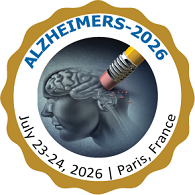Call for Abstract
Scientific Program
16th Global Alzheimers Summit, will be organized around the theme “”
Alzheimers-2026 is comprised of keynote and speakers sessions on latest cutting edge research designed to offer comprehensive global discussions that address current issues in Alzheimers-2026
Submit your abstract to any of the mentioned tracks.
Register now for the conference by choosing an appropriate package suitable to you.

